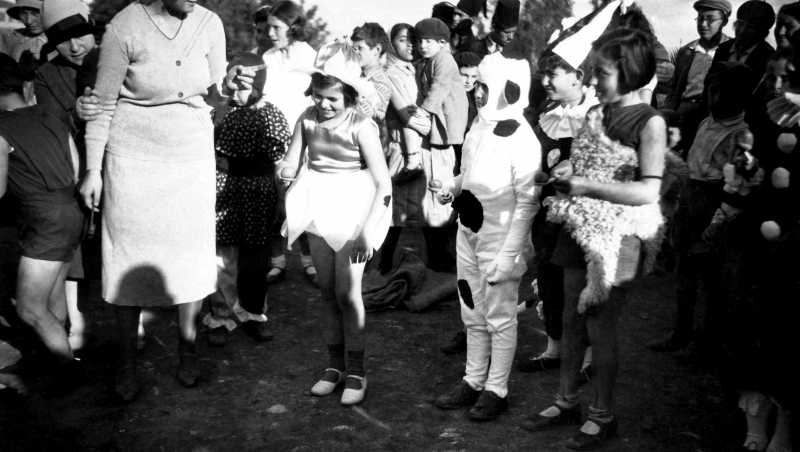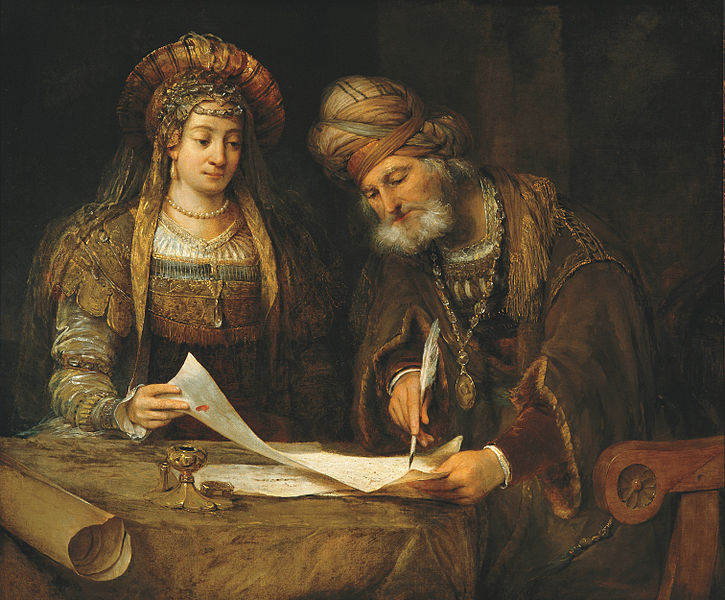Purim is No Celebration
 Children dressed in costumes for Purim courtesy of Wikicommons.
Children dressed in costumes for Purim courtesy of Wikicommons. Only on Halloween would you expect to meet Xena Princess Warrior out on the streets, unless that is, she is with a small lion with payot, in which it case it is likely Purim. Turning ghouls into a street party to ward away our nightmares or playing up lethal anti-Semites to downplay our real fears is all in the human spirit. So why do we dress up and have fun on days that represent evil? To confront it or hide from it?
The Book of Esther is a challenging text, which does not call for much celebration. On the contrary it is a clear demonstration that anti-Semitism is nothing new. It is not Islamic as the Book of Esther was written a thousand years before Mohammed was born. It is not modern as the story of Esther is set in the ancient Babylonian city of Sura. It is not even Christian for that matter as Jesus of Nazareth would have listened to the Megillah reading in his synagogue (although unlikely he dressed up as a fluffy pink rabbit). Like many of the anti-Semitisms through the ages it was born out of jealousy and irrational hatred. It was also genocidal. All Jews were to be murdered according to the edict of Haman.
Notably, the anti-Semitism of Haman also had the full endorsement of power. The King himself signs and seals the edict – although later seems to not understand its significance when Esther finally confronts him. It is a lethal movement of the middle class supported by the governing power of the day.
What is curious about the story is that Esther is an orphaned Jewish refugee who then intermarries and hides her identity for fear of her life. While the virtues of inter-marriage and assimilation are not the moral of the story, it is only because she married out that she was then in the right place and at the right time to help her fellow Jews. I suspect that Orthodox Jews are not celebrating her assimilation, but rather the mysterious hand of God to work in spite of her compromised situation.
Esther and her cousin Mordechai triumph, the Jews are saved, but they remain allied to the King that signed the death of the Jews and in addition carry out a revenge massacre right across the Kingdom aimed at ‘the enemies of the Jews’. Esther and Mordechai carry out state sanctioned murder, which would probably qualify as something akin to crimes against humanity today. I wonder why we celebrate that?
 Esther and Mordecai writing the first letter of Purim courtesy of Wikicommons.
Esther and Mordecai writing the first letter of Purim courtesy of Wikicommons.I hesitated to explore this text at this time, just because there are no good lessons to come out of it and anyway it is an historical novella so should not be taken so seriously. Except it made it made it into scripture, so someone did take it seriously. Certainly, it is not a story to celebrate because the evil intent of Haman’s anti-Semitism and the bloodbath of revenge that followed served no one’s interest. Perhaps the strength of Esther, her patience to draw out the King and Haman, her diplomacy and guile in the face of her enemies makes her an example of courage.
I am disturbed that at a time when anti-Semitism is ravaging the Jewish community all over again, the Purim frolics are horribly misleading. The significance of the costumes is indeed to ‘hide’ from the natural order of the world. But it seems to me there is a lot more hiding happening. We are hiding from the reality that anti-Semitism is no longer a royal order but a systemic way of thinking, deeply ingrained in our society. Esther and Mordechai could halt the bloodbath with a royal seal. We are hiding from the fact we have no such luxury today. Unlike Esther, we face left and right fascist, Christian, secular, political, and Islamist anti-Semitism, and note, there is no ‘Je suis Esther’ campaign.
We are also hiding from the fact that subsequent to Haman, Hitler was successful in carrying out the genocide of the Jews and the survivors of the Holocaust are better examples than Mordechai or Esther. Unlike the Jews of Sura they did not evade the ravages of genocidal anti-Semitism, but took its full force until they were almost eliminated. Maybe the book of Esther predicted it, but there was no triumph, no happy end. There was also no revenge. The survivors of the Shoah did not turn on their enemies or kill those who wanted them dead. Instead they walked a road of dignity and humility. I have watched countless testimonies in the USC Shoah Foundation’s Visual History Archive and never once heard a survivor suggest revenge. Instead I have heard about overcoming hatred with love and respect and tolerance.
Now that is something to celebrate, because the survivors of the Shoah have shown a better way, given us a better chance. I am sure the fluffy lion with peyot had a fabulous day, enjoyed the festivities, and filled up on the jam-filled ears of Haman. I wonder if his parents told him that he will need to grow up with courage, patience and guile, and to follow the example of Jews who suffered in more recent times who are stronger people than either Mordechai or Esther are reported to be in the Megillah.
Like this article? Get our e-newsletter.
Be the first to learn about new articles and personal stories like the one you've just read.
